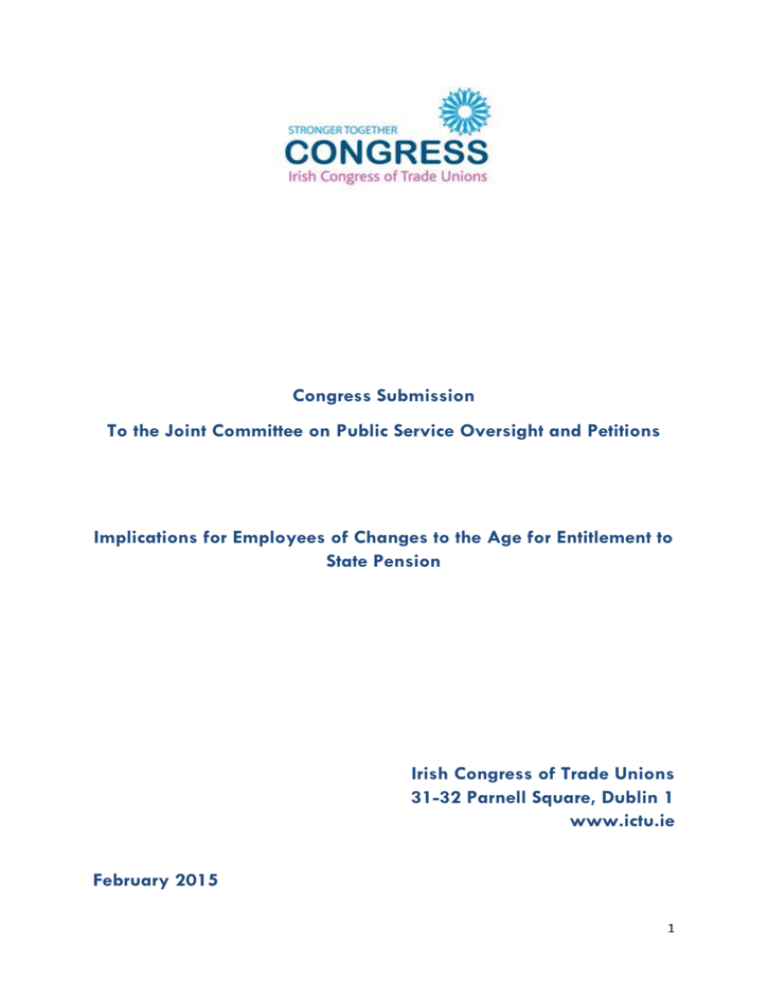The changes to state pension age
advertisement

Congress Submission To the Joint Committee on Public Service Oversight and Petitions Implications for Employees of Changes to the Age for Entitlement to State Pension Irish Congress of Trade Unions 31-32 Parnell Square, Dublin 1 www.ictu.ie February 2015 1 Executive Summary Citizens are being deprived of a significant benefit they earned and paid for. This measure is not designed to help older workers to stay in employment. Employers and unions were given no opportunity to consider the complex labour market issues involved. Ireland is going further and faster in this regard than every other country in the EU. No-one has explained to the Irish public why we must have the highest public pension age in the EU. This measure makes nonsense of the advice that the Pension Board give about financial planning for retirement. This measure flies in the face of the principles of pension reform. The Troika did not impose this measure. This measure was contrived by politicians and public officials who will continue to enjoy good pension from age 65 and earlier. Ireland’s cosseted pensioned elite, who enacted this measure, will do nothing to mitigate this injustice. 2 THE CHANGES TO STATE PENSION AGE Thank you for the invitation to speak to your Committee regarding the rising State Pension age. This hasty arbitrary diktat, we are told, was agreed with the Troika. There was no political debate; no public consultation and no cost benefit analysis of the measure. There was no consideration given to the significant labour market issues involved. Neither was there thought given to issues of fair play, or equity, or minimising hardship to those worst affected. There are social policy, labour market, industrial relations pension policy and planning issues, social insurance issues and issue of social cohesion involved. However these are merely consequences and maybe even unintended consequences. Neither should anyone be fooled by the notion that this has something to do with austerity. Long before 2008 the Department of Social Protection and the Pension Board and (to their now shame I hope) the Society of Actuaries were putting out spurious demographics to stave off any demand for improved State pension entitlement and to try to confiscate entitlements already earned and paid for. Citizens Are Being Deprived of a Benefit They Earned and Paid For No information was given to the workers who are to lose circa €12,000, €24,000 or €36,000 (in today’s money and depending on their age). Almost 15% of salary was paid on their behalf in Pay Related Social Insurance (PRSI) over the years (i.e. employer/employee contributions). Many of these workers also worked and paid taxes throughout their working lives. They are now victims of a decision made by people who will suffer no loss but rather continue to enjoy good pensions from age 65 and younger. There is no equity or justice in this decision and it will be damaging to social cohesion in Ireland. Working and Living Longer 3 Apologists for this measure suggest that, as people are living longer, it is desirable that they should work longer. Congress holds that people should be free to work longer if they wish but should not be obliged to, in order to avoid poverty. No provision has been made to facilitate workers remaining in employment after age 65. Congress asked the Department of Social Protection, who sponsored the legislation, if it would continue to terminate its employees at age 65 regardless of whether they qualify for a State pension. We got no answer. Neither officials in the Department of Social Protection or in the Department of Enterprise Trade and Employment had given any signal to private sector employers whether to retain or dump their employees at 65 regardless of pension entitlement. This measure is not designed to help older workers to stay in employment. It is designed to deny them an entitlement. Labour Market Issues Employers and unions were given no opportunity to consider the other complex labour market issues involved. IBEC was concerned that the lack of clarity concerning the legality or otherwise of sacking a person on the 65th birthday could lead to litigation. Congress was more concerned that a worker terminated with no State pension entitlement might picket his or her employer. Other labour market issue that were ignored were: The effects on morale and productivity of workers either being retained in, or forced out of employment against their will. The Labour Market rigidities involved in conferring rights on older workers to keep their jobs. (As if) Whether a worker in the construction and related industries can work safety at heights and in inclement conditions up to the age of 68. 4 The effect on youth unemployment and worker morale of older workers holding down positions which otherwise might provide opportunities for advancement. Pension Planning - A Long Term Discipline It has been a long-standing public policy that citizens should plan their pension provision over the long-term. This measure makes nonsense of the advice the Pension Board gives about financial planning for retirement. How can workers plan for their retirement, if after paying PRSI for forty years, they can be denied three years’ pension with little notice? Making major pension changes in such an ad-hoc way in not just a cruel injustice to individual workers; it is a denial of the right of legitimate expectation. The long-term damage done will be to the reputation of pensions. Why would anyone agree to pay into either a public or a private pension if the rules can be changed at the eleventh hour to withdraw the entitlements earned and paid for? Congress accepts that the pension age will rise throughout Europe. However, Ireland is going further and faster in this regard than every other country in the EU. We believe that pension reform must be longterm and hurrying these measures without proper consideration or debate is wrong in principle and potentially disastrous in practice. These changes will not save the State much in the short to medium term but will impose severe financial hardship on individuals in the first three years in what should be best the best years of their retirement. We asked the government (current and previous) to postpone these changes and to increase the pension age in a fairer and more gradual way. Congress suggested that someone who reaches 65 this year could lose one month’s pension entitlement and next year a person who reaches 65 could lose two months and so on, the same result can be achieved in an equitable fashion. Of course we were ignored. The lack of public debate has meant that no one has explained to the Irish public why we must have the highest public pension age in the EU. The Principles of Pension Reform 5 Pension reform should be based on certain principles: Should be long term to do as little violence as possible to the right of legitimate expectation. Should, as much as possible, protect accrued benefits already earned and paid for. Should involve consultation with stakeholders so that related matters such as labour market policy issues can be considered in advance. Should be based on the principle of equity. Losses and hardship should not be imposed on certain categories of worker while elites remain immune. Give workers and their employer sufficient time to adjust their expectations and financial plans. The Troika Did Not Impose This Measure Long before the advent of the Troika, successive reports, produce by the well pensioned elites, rehearsed spurious demographic and other arguments to attack the modest public pension entitlement of private sector workers. No doubt the Troika demanded raising the pension age, but Congress does not believe they would have been prescriptive. This is a government decision (advanced by the previous government). The decision to change the eligibility criteria to take €1,500 per annum from the pension of those, mainly women workers, who had to spend some time out of the workforce was also a very ‘Irish’ decision. There is something very incongruous about politicians and public officials making decision which hurt other citizens but in no way impact on their own very comfortable arrangements. A fifty-nine year old private sector worker, who started work at sixteen and who has had circa 15% of their income paid in PRSI since then, will lose circa €24,000 (two years’ State pension). Such a person 6 will now get their pension at age 67 after fifty one years in work. In today’s terms, using the average industrial wage as a benchmark, circa €362,000 in PRSI contributions was paid on this worker’s behalf during his/her career. For any politician who went along with this measure, who was aged 59 last year, it is certain he/she will not be asked to wait till age 67 and then settle for a State pension of €12,000 per annum. How many hundred thousands of tax payers’ money will politicians receive before they reach age 67 will depend on when they retire and how many elite pensions they qualify for. Congress challenged this measure to no avail over the last few years. We have no expectation that Ireland’s pension cosseted elite will do anything to mitigate this injustice. This is not the first Oireachtas Committee I have addressed on this issue. When private sector workers wake up to how they have been signalled out for attack I hope they resist. The rise to 67 should be pushed out into the future and the rise to 68 should happen only when it happens in the rest of Europe. Fergus Whelan Industrial Officer Irish Congress of Trade Unions 7





